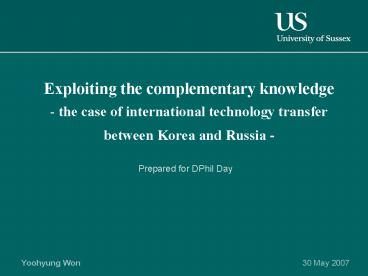Exploiting the complementary knowledge - PowerPoint PPT Presentation
1 / 20
Title:
Exploiting the complementary knowledge
Description:
International technology transfer (ITT) is ... Technologies transferred through. humans. ITT from the triad. ITT from Russia. 5. Findings ... – PowerPoint PPT presentation
Number of Views:25
Avg rating:3.0/5.0
Title: Exploiting the complementary knowledge
1
- Exploiting the complementary knowledge
- the case of international technology transfer
- between Korea and Russia -
Prepared for DPhil Day
2
1. Introduction
- International technology transfer (ITT) is
mechanisms for shifting information and knowledge
across borders and its effective diffusion
(UNCTAD, 2004)?
3
1. Introduction
Why taking place?
- cost risk sharing (buy vs. make)?
- complement internal capability (open vs. closed
system)?
- only possible way to acquire relevant knowledge
for late-comers
4
1. Introduction
Patterns and trends
- sharing common ground (regional, cultural
proximity)?
- relatively codified knowledge (packaged or
mature technologies)?
- market channels (licensing, assembly plants, FDI
)
5
1. Introduction
Many researches focusing on
- identifying motivations, channels, patterns by
macro analysis - (large sample of survey or existing data)?
- identifying mechanism of ITT from developed ?
developing - nations (national or industry level analysis)?
6
2. Research Topic
Position of my research tackles ITT issues
- between contrasting partners
- by non-packaged knowledge
- by non-market channels
7
2. Research Topic
ITT between Korea Russia appropriate for my
criteria
ltKorea VS. Russiagt
- But they implement active ITT..led by
government program
8
2. Research Topic
The hypotheses is
- The gap of contrasting knowledge capabilities
between two - nations can be narrowed by appropriate policy
measure and - public involvement.
The research question is
- What is the role of policy measure and public
involvement? - What is key factor to make successful technology
transfer?
9
3. Theory Methodology
Central theoretical framework absorptive
capacity
10
3. Theory Methodology
Firms absorptive capacity
TODOROVA (2007)?
11
3. Theory Methodology
Interview based case study
- Core Technology Transfer Program (CTTP), a
Korean government - sponsored RD program, is my main target of
analysis - (22 principal participated researcher were
interviewed)?
- In depth analysis of 4 representative projects
under the program - (in terms of commercial success or failure)?
12
4. Empirical investigation
13
4. Empirical investigation
How CTTP operate? systemic absorptive capacity
view
CTTP
Market
Technology Application
14
4. Empirical investigation
Through the program (19932005)?
- 119 technologies acquired, US 40million spent
by MOST
- About 2030 technologies are considered
successful
15
4. Empirical investigation
Case 1 LG air-con Whisen- Plasma coating
technology
- LG Electronics started air-conditioner business
in 1968
- Until mid 1990s, LG air-con was just No.3 local
player
- In 19961999, LG was developing new
air-conditioner - Whisen, applying Russian technologies
through CTTP
- LG became world leader in 2000 with 11.6 market
share
- LG Air-con Whisen is 8 consecutive years world
market leader - with 19.6 market share in 2007
16
4. Empirical investigation
Case 1 LG air-con Whisen- Plasma coating
technology
CTTP
Whisen
Technology Application
Technology Acquisition (Transforming)?
Gov. Office In Russia
KIST
LG
17
4. Empirical investigation
Case 1 LG air-con Whisen- Plasma coating
technology
Coating material
plasma gas is injected Vacuum space
Metal
- Characteristic of metal can be changed to
hydrophile property - (favorable water) or to the opposite
- LG applied this to the surface of heat exchanger
of whisen so - that it could improve cooling remarkably
while reducing noise - and electricity consumption
18
5. Findings
Key findings from interviews
19
5. Findings
Comparison of Technology transfer between Russia
the triad
20
5. Findings
- Win-win mode of cooperative relationship should
be built to - sustain such kind of collaborative activities
- Bridging and integrating role of public RD
institutes is more - effective when firms have clear specific
technological needs.
- Not only to find appropriate technologies and
partners, but also, - integrate and transform the those technology
into own capabilities
- Effective communication among actors is key to
strengthen the - systemic absorptive capacity































